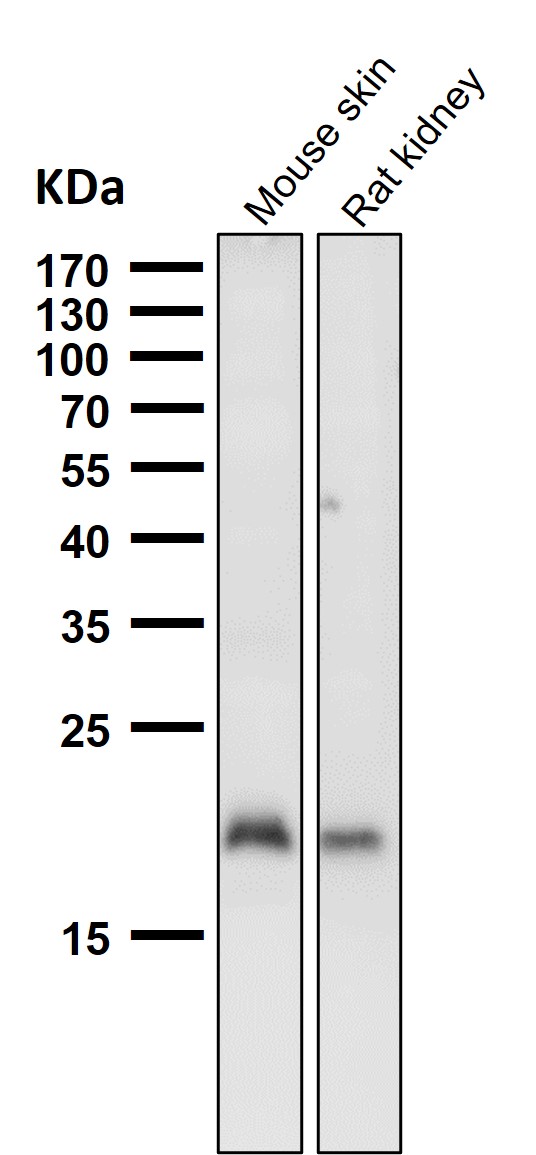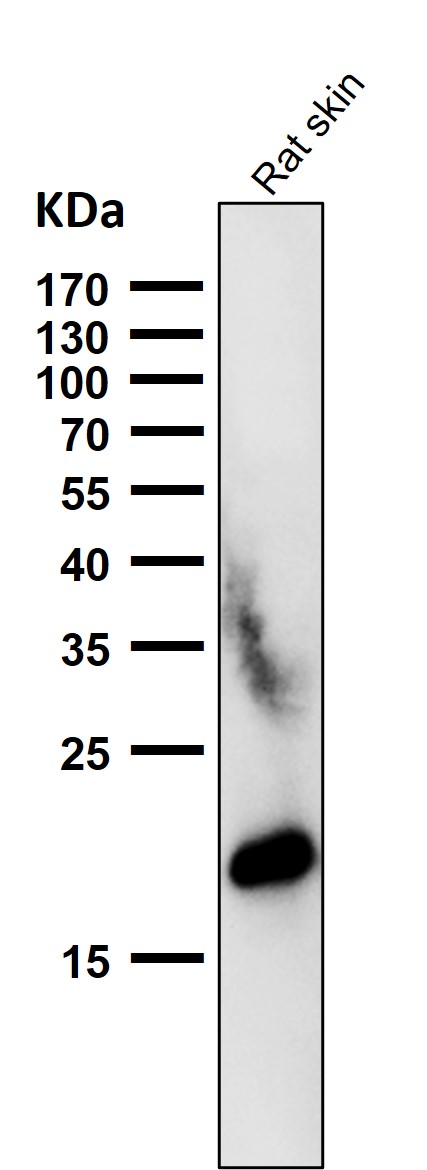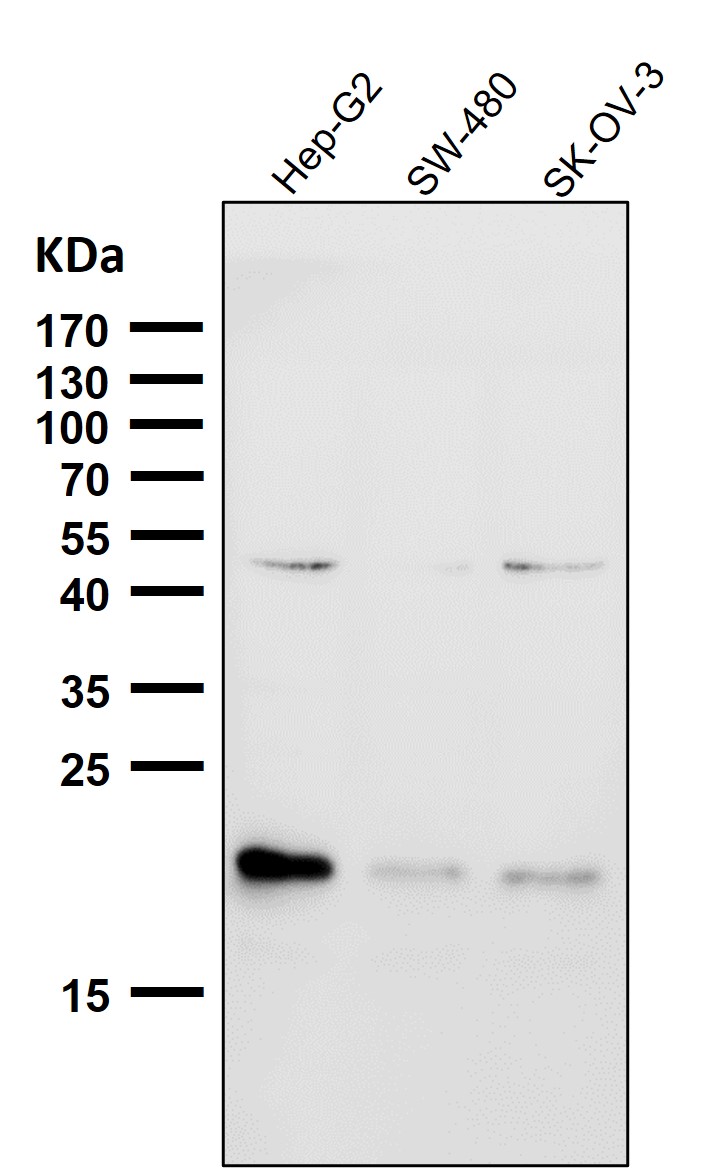


| WB | 咨询技术 | Human,Mouse,Rat |
| IF | 咨询技术 | Human,Mouse,Rat |
| IHC | 咨询技术 | Human,Mouse,Rat |
| ICC | 技术咨询 | Human,Mouse,Rat |
| FCM | 咨询技术 | Human,Mouse,Rat |
| Elisa | 咨询技术 | Human,Mouse,Rat |
| Aliases | Claudin1; CLD1l;CLDN 1; ILVASC; SEMP1;;Claudin 1 |
| WB Predicted band size | Calculated MW: 23 kDa ; Observed MW: 19 kDa |
| Host/Isotype | Rabbit IgG |
| Antibody Type | Primary antibody |
| Storage | Store at 4°C short term. Aliquot and store at -20°C long term. Avoid freeze/thaw cycles. |
| Species Reactivity | Human,Mouse,Rat |
| Immunogen | A synthesized peptide derived from human Claudin 1 |
| Formulation | Purified antibody in PBS with 0.05% sodium azide,0.05% BSA and 50% glycerol. |
+ +
以下是3-4条关于Claudin1抗体的示例参考文献(内容为模拟概括,实际文献需根据具体研究核实):
---
1. **文献名称**: *Claudin-1 is a high-affinity receptor for hepatitis C virus and regulates viral entry*
**作者**: Evans MJ et al.
**摘要**: 研究揭示了Claudin1抗体在阻断丙型肝炎病毒(HCV)进入宿主细胞中的作用,证明Claudin1是HCV入侵的关键受体之一,为抗病毒治疗提供新靶点。
---
2. **文献名称**: *Claudin-1 overexpression in intestinal epithelial cells enhances susceptibility to adenocarcinoma*
**作者**: Dhawan P et al.
**摘要**: 通过Claudin1抗体检测发现,结肠癌细胞中Claudin1异常高表达会破坏紧密连接屏障功能,促进肿瘤侵袭和转移,提示其作为预后标志物的潜力。
---
3. **文献名称**: *Targeting claudin-1 in skin barrier repair using monoclonal antibodies*
**作者**: De Benedetto A et al.
**摘要**: 利用Claudin1特异性抗体研究皮肤屏障功能,发现Claudin1缺失与特应性皮炎相关,抗体干预可恢复表皮紧密连接完整性。
---
4. **文献名称**: *Claudin-1 monoclonal antibodies for diagnostic applications in hepatocellular carcinoma*
**作者**: Zhou Y et al.
**摘要**: 开发了高特异性Claudin1单克隆抗体,验证其在肝癌组织中的诊断价值,显示Claudin1表达水平与患者生存率显著相关。
---
注:以上为示例,实际文献需通过PubMed/Google Scholar等平台检索确认。
Claudin1 is a key protein component of tight junctions, specialized cell-cell adhesion structures that regulate paracellular permeability and maintain epithelial and endothelial barrier integrity. As a member of the claudin family, it consists of four transmembrane domains and plays a critical role in controlling the selective transport of ions and molecules across tissues. Claudin1 is widely expressed in epithelial and endothelial tissues, including the skin, liver, and kidneys, and its dysregulation has been linked to various pathologies such as cancer, inflammatory skin disorders, and hepatitis C virus (HCV) infection.
Antibodies targeting Claudin1 are essential tools for studying its localization, expression levels, and functional roles in both physiological and diseased states. In cancer research, Claudin1 antibodies help investigate its dual role as a tumor suppressor or promoter, depending on the tissue context, with altered expression observed in hepatocellular carcinoma, breast cancer, and colorectal cancer. In dermatology, these antibodies are used to explore skin barrier defects in conditions like atopic dermatitis and psoriasis. Additionally, Claudin1 antibodies have been pivotal in elucidating its role as a coreceptor for HCV entry into hepatocytes.
Commercially available Claudin1 antibodies are typically validated for applications like Western blotting, immunohistochemistry, and immunofluorescence. However, variability in antibody specificity due to differences in clonal sources or epitope recognition necessitates careful validation for experimental reproducibility. Research using these antibodies continues to advance therapeutic strategies, including Claudin1-targeted drugs for cancer and barrier-related diseases.
×